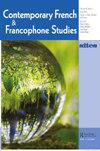写作与死亡:让·热内的手提箱
IF 0.2
4区 文学
0 LITERATURE, ROMANCE
引用次数: 0
摘要
热内生前两周交给律师的两个手提箱中的一个手提箱里有一张纸条,上面写着:“我犯了逃避犯罪的罪,逃避起诉及其危险的罪。”这是他不会发表的遗嘱,但在他死后34年,阿尔贝·迪希将会发表这封信。我说我是谁,而不是活出我是谁,说我是谁,我不再是谁。”通过这种姿态,热内揭示了一个基本的悖论:写作行为包含了背叛;任何媒介都与其声称要召唤的内容不一致。同样,热内写道,戏剧必须不是在舞台上表演,而是在墓地和灵灰安置所表演,以表明再现首先是一个毁灭的过程。这种对媒体致命力量的敏锐认识最终迫使热内进入了一种社论式的沉默——而不是文字式的沉默:他停止出版,但继续写作。本文探讨了这种写作的独特地位及其与死亡的关系。关键词:CirqueÉcritureGenetMortThéâtreValises注:1 .单因素分析+单因素分析+单因素分析;作者简介:amin Erfani是纽约城市大学雷曼学院法国和比较文学教授,专攻戏剧、文学和精神分析理论。他也是瓦尔本文章由计算机程序翻译,如有差异,请以英文原文为准。
L’Écriture et la mort : Les Valises de Jean Genet
AbstractOn a piece of paper, stored in one of the two suitcases that Jean Genet gave to his lawyer two weeks before his death—a testament to what he will not have published, and which will nevertheless be published by Albert Dichy thirty-four years after his death—Genet writes: “I committed the crime of escaping crime, of escaping prosecution and its risks. I said who I was, instead of living who I was, and saying who I was, I was no longer.” Through this gesture, Genet exposes a fundamental paradox: the act of writing consists of a betrayal; any medium remains at odds with the content it claims to summon. In the same way, Genet wrote that theater must be performed, not on stages, but in cemeteries and columbaria, to show how representation is above all a process of annihilation. This acute awareness of the deadly power of the medium eventually pushes Genet into an editorial—not a scriptorial—silence: he stops publishing but continues to write. This article examines the singular status of that writing and its relationship to death.Keywords: CirqueÉcritureGenetMortThéâtreValises Notes1 Pour une analyse plus étendue de cette déclaration, voir Erfani.Additional informationNotes on contributorsAmin ErfaniAmin Erfani is a professor of French and Comparative Literature at Lehman College, City University of New York, specializing in theater and literary and psychoanalytic theory. He is also an American English translator of the works of Valère Novarina and Bernard-Marie Koltès.
求助全文
通过发布文献求助,成功后即可免费获取论文全文。
去求助
来源期刊

Contemporary French and Francophone Studies
LITERATURE, ROMANCE-
CiteScore
0.30
自引率
0.00%
发文量
43
期刊介绍:
An established journal of reference inviting all critical approaches on the latest debates and issues in the field, Contemporary French & Francophone Studies (formerly known as SITES) provides a forum not only for academics, but for novelists, poets, artists, journalists, and filmmakers as well. In addition to its focus on French and Francophone studies, one of the journal"s primary objectives is to reflect the interdisciplinary direction taken by the field and by the humanities and the arts in general. CF&FS is published five times per year, with four issues devoted to particular themes, and a fifth issue, “The Open Issue” welcoming non-thematic contributions.
 求助内容:
求助内容: 应助结果提醒方式:
应助结果提醒方式:


